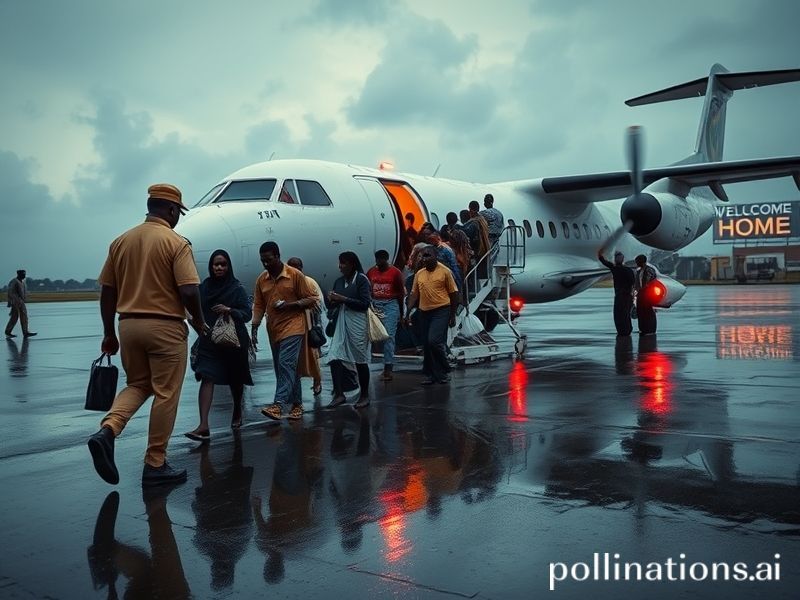The Ghana Express: How the West Turns Deportation into a Global Frequent-Flyer Program
Accra’s Kotoka International Airport has, of late, become the involuntary terminus for a very particular kind of frequent-flyer program: the modern deportation. While the arrivals board flashes the usual banalities—“Dubai, 14:30, On Time”—it neglects to list the bonus routes pioneered by Washington, London, Berlin, and even Stockholm: red-eye specials with no in-flight duty-free, plastic-cuffed passengers, and immigration officers who double as reluctant cabin crew. Call it the “Ghana Express,” a sort of reverse colonialism where the Empire finally returns the merchandise, albeit slightly dented and jet-lagged.
The global headlines prefer the sanitized phrase “enhanced returns,” but the choreography is as old as empire itself: dawn raids, chartered jets, and a discreet press release that praises “bilateral cooperation.” The United Kingdom, having apparently run out of Rwandan hotels willing to star in Priti Patel’s fever dreams, now off-loads its undesirables to Accra with the same enthusiasm it once displayed when off-loading unwanted tea into Boston Harbour. Across the Atlantic, the United States—land of the free, home of the 737 MAX—has resumed “mass removal flights” after a pandemic pause, because nothing screams public-health protocol like packing 120 deportees into recycled air and calling it a diplomatic win. Germany, not to be outdone, has discovered that its constitution allows “double punishment,” so a Ghanaian who shoplifted a bratwurst in 2019 can enjoy both German jail time and a complimentary ticket back to Kumasi—efficiency, Teutonic style.
Ghana itself, ever the gracious host, greets these involuntary tourists with a cocktail of resignation and entrepreneurial spirit. Airport porters calculate overtime; taxi drivers rehearse their “Welcome home, brother—need a SIM card?” pitches; and local journalists tally the foreign-exchange value of the escort officers’ per diems. The government, meanwhile, signs Memoranda of Understanding the way other people accept LinkedIn requests—polite, non-committal, and fully aware that the other party will ghost you the moment optics improve.
Yet the real punchline is planetary. Deportations to Ghana are no longer a bilateral hiccup; they are a barometer of the West’s mood swings. When inflation bites in London, the Home Office suddenly remembers every overstayed tourist visa. When U.S. midterms approach, ICE discovers fresh urgency in decade-old asylum rejections. Climate change, that other global inconvenience, is already queuing up the next wave: drought-stricken Ghanaians heading north, only to be flung south again on carbon-spewing jets—geo-political ping-pong played with human bodies.
International law, ever the well-dressed bystander, clutches its non-refoulement principles like a silk handkerchief while averting its eyes. The United Nations issues press statements calibrated to the density of parchment, NGOs tweet righteous GIFs, and everyone agrees that “root causes” must be addressed—preferably after the current budget cycle. Meanwhile, Ghana’s diaspora WhatsApp groups toggle between outrage and pragmatic advice: “Delete your UK Netflix, cousin; you’ll need the data bundle for job alerts.”
The broader significance? We are witnessing the institutionalization of a new circular migration, one where the route map is drawn by polling data and the frequent-flyer miles accrue to defense contractors leasing the planes. Every deportee landing in Accra is also a data point in some minister’s PowerPoint, proof that sovereign borders remain intact, at least until the next election. The global economy gets to externalize its social contradictions; Ghana gets a fresh cohort of embittered, multilingual citizens with excellent knowledge of European surveillance techniques. Think of it as reverse brain-drain with a side of trauma.
And so, as another chartered Boeing banks over the Gulf of Guinea, one can almost hear the universe sigh: humanity has invented reusable rockets, microchip implants, and oat milk, yet our grand solution to human mobility remains the medieval tactic of putting people on boats and hoping the current carries them far enough away. The Ghana Express, ladies and gentlemen, is boarding again—no seat selection, no loyalty points, and a final destination that looks suspiciously like the point of departure. Fasten your shackles; irony is the only in-flight entertainment left.







